Fleurs du Mal Magazine


Or see the index
.jpg)
Novalis
(Friedrich von Hardenberg, 1772–1802)
Hymnen an die Nacht 3
Einst da ich bittre Thränen vergoß, da in Schmerz aufgelöst meine Hoffnung zerrann, und ich einsam stand am dürren Hügel, der in engen, dunkeln Raum die Gestalt meines Lebens barg – einsam, wie noch kein Einsamer war, von unsäglicher Angst getrieben – kraftlos, nur ein Gedanken des Elends noch. – Wie ich da nach Hülfe umherschaute, vorwärts nicht konnte und rückwärts nicht, und am fliehenden, verlöschten Leben mit unendlicher Sehnsucht hing: – da kam aus blauen Fernen – von den Höhen meiner alten Seligkeit ein Dämmerungsschauer – und mit einemmale riß das Band der Geburt – des Lichtes Fessel. Hin floh die irdische Herrlichkeit und meine Trauer mit ihr – zusammen floß die Wehmuth in eine neue, unergründliche Welt – du Nachtbegeisterung, Schlummer des Himmels kamst über mich – die Gegend hob sich sacht empor; über der Gegend schwebte mein entbundner, neugeborner Geist. Zur Staubwolke wurde der Hügel – durch die Wolke sah ich die verklärten Züge der Geliebten. In ihren Augen ruhte die Ewigkeit – ich faßte ihre Hände, und die Thränen wurden ein funkelndes, unzerreißliches Band. Jahrtausende zogen abwärts in die Ferne, wie Ungewitter. An Ihrem Halse weint ich dem neuen Leben entzückende Thränen. – Es war der erste, einzige Traum – und erst seitdem fühl ich ewigen, unwandelbaren Glauben an den Himmel der Nacht und sein Licht, die Geliebte.
.jpg)
Novalis poetry
fleursdumal.nl magazine
.jpg)
Anne Brontë
(1820-1849)
Vanitas Vanitatum,
Omnia Vanitas
In all we do, and hear, and see,
Is restless Toil and Vanity.
While yet the rolling earth abides,
Men come and go like ocean tides;
And ere one generation dies,
Another in its place shall rise;
THAT, sinking soon into the grave,
Others succeed, like wave on wave;
And as they rise, they pass away.
The sun arises every day,
And hastening onward to the West,
He nightly sinks, but not to rest:
Returning to the eastern skies,
Again to light us, he must rise.
And still the restless wind comes forth,
Now blowing keenly from the North;
Now from the South, the East, the West,
For ever changing, ne’er at rest.
The fountains, gushing from the hills,
Supply the ever-running rills;
The thirsty rivers drink their store,
And bear it rolling to the shore,
But still the ocean craves for more.
‘Tis endless labour everywhere!
Sound cannot satisfy the ear,
Light cannot fill the craving eye,
Nor riches half our wants supply,
Pleasure but doubles future pain,
And joy brings sorrow in her train;
Laughter is mad, and reckless mirth–
What does she in this weary earth?
Should Wealth, or Fame, our Life employ,
Death comes, our labour to destroy;
To snatch the untasted cup away,
For which we toiled so many a day.
What, then, remains for wretched man?
To use life’s comforts while he can,
Enjoy the blessings Heaven bestows,
Assist his friends, forgive his foes;
Trust God, and keep His statutes still,
Upright and firm, through good and ill;
Thankful for all that God has given,
Fixing his firmest hopes on Heaven;
Knowing that earthly joys decay,
But hoping through the darkest day.
Memory
Brightly the sun of summer shone
Green fields and waving woods upon,
And soft winds wandered by;
Above, a sky of purest blue,
Around, bright flowers of loveliest hue,
Allured the gazer’s eye.
But what were all these charms to me,
When one sweet breath of memory
Came gently wafting by?
I closed my eyes against the day,
And called my willing soul away,
From earth, and air, and sky;
That I might simply fancy there
One little flower–a primrose fair,
Just opening into sight;
As in the days of infancy,
An opening primrose seemed to me
A source of strange delight.
Sweet Memory! ever smile on me;
Nature’s chief beauties spring from thee;
Oh, still thy tribute bring
Still make the golden crocus shine
Among the flowers the most divine,
The glory of the spring.
Still in the wallflower’s fragrance dwell;
And hover round the slight bluebell,
My childhood’s darling flower.
Smile on the little daisy still,
The buttercup’s bright goblet fill
With all thy former power.
For ever hang thy dreamy spell
Round mountain star and heather bell,
And do not pass away
From sparkling frost, or wreathed snow,
And whisper when the wild winds blow,
Or rippling waters play.
Is childhood, then, so all divine?
Or Memory, is the glory thine,
That haloes thus the past?
Not ALL divine; its pangs of grief
(Although, perchance, their stay be brief)
Are bitter while they last.
Nor is the glory all thine own,
For on our earliest joys alone
That holy light is cast.
With such a ray, no spell of thine
Can make our later pleasures shine,
Though long ago they passed.

Anne Brontë poetry
fleursdumal magazine
More in: Anne, Emily & Charlotte Brontë, Brontë, Anne, Emily & Charlotte
.jpg)
Novalis
(Friedrich von Hardenberg, 1772–1802)
Hymnen an die Nacht 2
Muß immer der Morgen wiederkommen? Endet nie des Irdischen Gewalt? unselige Geschäftigkeit verzehrt den himmlischen Anflug der Nacht. Wird nie der Liebe geheimes Opfer ewig brennen? Zugemessen ward dem Lichte seine Zeit; aber zeitlos und raumlos ist der Nacht Herrschaft. – Ewig ist die Dauer des Schlafs. Heiliger Schlaf – beglücke zu selten nicht der Nacht Geweihte in diesem irdischen Tagewerk. Nur die Thoren verkennen dich und wissen von keinem Schlafe, als den Schatten, den du in jener Dämmerung der wahrhaften Nacht mitleidig auf uns wirfst. Sie fühlen dich nicht in der goldnen Flut der Trauben – in des Mandelbaums Wunderöl, und dem braunen Safte des Mohns. Sie wissen nicht, daß du es bist der des zarten Mädchens Busen umschwebt und zum Himmel den Schoß macht – ahnden nicht, daß aus alten Geschichten du himmelöffnend entgegentrittst und den Schlüssel trägst zu den Wohnungen der Seligen, unendlicher Geheimnisse schweigender Bote.
.jpg)
Novalis poetry
fleursdumal.nl magazine
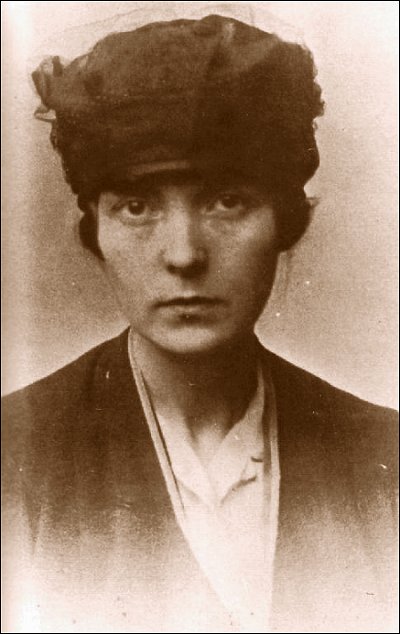
Katherine Mansfield
(1888-1923)
Covering Wings
Love! Love! Your tenderness,
Your beautiful, watchful ways
Grasp me, fold me, cover me;
I lie in a kind of daze,
Neither asleep nor yet awake,
Neither a bud nor flower.
Brings to-morrow
Joy or sorrow,
The black or the golden hour?
Love! Love! You pity me so!
Chide me, scold me—cry,
“Submit—submit! You must not fight!”
What may I do, then? Die?
But, oh my horror of quiet beds!
How can I longer stay!
“One to be ready,
Two to be steady,
Three to be off and away!”
Darling heart—your gravity!
Your sorrowful, mournful gaze—
“Two bleached roads lie under the moon,
At the parting of the ways.”
But the tiny, tree-thatched, narrow lane,
Isn’t it yours and mine?
The blue-bells ring
Hey, ding-a-ding, ding!
And buds are thick on the vine.
Love! Love! Grief of my heart!
As a tree droops over a stream
You hush me, lull me, dark me,
The shadow hiding the gleam.
Your drooping and tragical boughs of grace
Are heavy as though with rain.
Run! Run!
Into the sun!
Let us be children again.
Katherine Mansfield poetry
fleursdumal.nl magazine
More in: Katherine Mansfield, Mansfield, Katherine
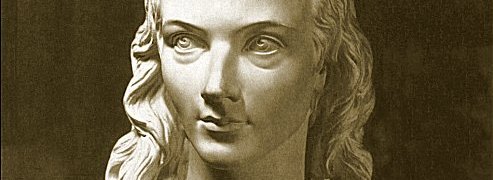
Novalis
(Friedrich von Hardenberg, 1772–1802)
Hymnen an die Nacht 1
Welcher Lebendige, Sinnbegabte, liebt nicht vor allen Wundererscheinungen des verbreiteten Raums um ihn, das allerfreuliche Licht – mit seinen Farben, seinen Stralen und Wogen; seiner milden Allgegenwart, als weckender Tag. Wie des Lebens innerste Seele athmet es der rastlosen Gestirne Riesenwelt, und schwimmt tanzend in seiner blauen Flut – athmet es der funkelnde, ewigruhende Stein, die sinnige, saugende Pflanze, und das wilde, brennende, vielgestaltete Thier – vor allen aber der herrliche Fremdling mit den sinnvollen Augen, dem schwebenden Gange, und den zartgeschlossenen, tonreichen Lippen. Wie ein König der irdischen Natur ruft es jede Kraft zu zahllosen Verwandlungen, knüpft und löst unendliche Bündnisse, hängt sein himmlisches Bild jedem irdischen Wesen um. – Seine Gegenwart allein offenbart die Wunderherrlichkeit der Reiche der Welt.
Abwärts wend ich mich zu der heiligen, unaussprechlichen, geheimnißvollen Nacht. Fernab liegt die Welt – in eine tiefe Gruft versenkt – wüst und einsam ist ihre Stelle. In den Sayten der Brust weht tiefe Wehmuth. In Thautropfen will ich hinuntersinken und mit der Asche mich vermischen. – Fernen der Erinnerung, Wünsche der Jugend, der Kindheit Träume, des ganzen langen Lebens kurze Freuden und vergebliche Hoffnungen kommen in grauen Kleidern, wie Abendnebel nach der Sonne Untergang. In andern Räumen schlug die lustigen Gezelte das Licht auf. Sollte es nie zu seinen Kindern wiederkommen, die mit der Unschuld Glauben seiner harren?
Was quillt auf einmal so ahndungsvoll unterm Herzen, und verschluckt der Wehmuth weiche Luft? Hast auch du ein Gefallen an uns, dunkle Nacht? Was hältst du unter deinem Mantel, das mir unsichtbar kräftig an die Seele geht? Köstlicher Balsam träuft aus deiner Hand, aus dem Bündel Mohn. Die schweren Flügel des Gemüths hebst du empor. Dunkel und unaussprechlich fühlen wir uns bewegt – ein ernstes Antlitz seh ich froh erschrocken, das sanft und andachtsvoll sich zu mir neigt, und unter unendlich verschlungenen Locken der Mutter liebe Jugend zeigt. Wie arm und kindisch dünkt mir das Licht nun – wie erfreulich und gesegnet des Tages Abschied – Also nur darum, weil die Nacht dir abwendig macht die Dienenden, säetest du in des Raumes Weiten die leuchtenden Kugeln, zu verkünden deine Allmacht – deine Wiederkehr – in den Zeiten deiner Entfernung. Himmlischer, als jene blitzenden Sterne, dünken uns die unendlichen Augen, die die Nacht in uns geöffnet. Weiter sehn sie, als die blässesten jener zahllosen Heere – unbedürftig des Lichts durchschaun sie die Tiefen eines liebenden Gemüths – was einen höhern Raum mit unsäglicher Wollust füllt. Preis der Weltköniginn, der hohen Verkündigerinn heiliger Welten, der Pflegerinn seliger Liebe – sie sendet mir dich – zarte Geliebte – liebliche Sonne der Nacht, – nun wach ich – denn ich bin Dein und Mein – du hast die Nacht mir zum Leben verkündet – mich zum Menschen gemacht – zehre mit Geisterglut meinen Leib, daß ich luftig mit dir inniger mich mische und dann ewig die Brautnacht währt.
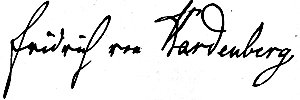
Novalis poetry
fleursdumal.nl magazine
.jpg)
A n n e B r o n t ë
(1820-1849)
Past Days
‘Tis strange to think there WAS a time
When mirth was not an empty name,
When laughter really cheered the heart,
And frequent smiles unbidden came,
And tears of grief would only flow
In sympathy for others’ woe;
When speech expressed the inward thought,
And heart to kindred heart was bare,
And summer days were far too short
For all the pleasures crowded there;
And silence, solitude, and rest,
Now welcome to the weary breast–
Were all unprized, uncourted then–
And all the joy one spirit showed,
The other deeply felt again;
And friendship like a river flowed,
Constant and strong its silent course,
For nought withstood its gentle force:
When night, the holy time of peace,
Was dreaded as the parting hour;
When speech and mirth at once must cease,
And silence must resume her power;
Though ever free from pains and woes,
She only brought us calm repose.
And when the blessed dawn again
Brought daylight to the blushing skies,
We woke, and not RELUCTANT then,
To joyless LABOUR did we rise;
But full of hope, and glad and gay,
We welcomed the returning day.
![]()
Acton Bell (Anne Brontë) poetry
fleursdumal.nl magazine
More in: Anne, Emily & Charlotte Brontë, Archive A-B, Brontë, Anne, Emily & Charlotte
.jpg)
Anne Brontë
(1820-1849)
Stanzas
Oh, weep not, love! each tear that springs
In those dear eyes of thine,
To me a keener suffering brings
Than if they flowed from mine.
And do not droop! however drear
The fate awaiting thee;
For MY sake combat pain and care,
And cherish life for me!
I do not fear thy love will fail;
Thy faith is true, I know;
But, oh, my love! thy strength is frail
For such a life of woe.
Were ‘t not for this, I well could trace
(Though banished long from thee)
Life’s rugged path, and boldly face
The storms that threaten me.
Fear not for me–I’ve steeled my mind
Sorrow and strife to greet;
Joy with my love I leave behind,
Care with my friends I meet.
A mother’s sad reproachful eye,
A father’s scowling brow–
But he may frown and she may sigh:
I will not break my vow!
I love my mother, I revere
My sire, but fear not me–
Believe that Death alone can tear
This faithful heart from thee.
If this be all
O God! if this indeed be all
That Life can show to me;
If on my aching brow may fall
No freshening dew from Thee;
If with no brighter light than this
The lamp of hope may glow,
And I may only dream of bliss,
And wake to weary woe;
If friendship’s solace must decay,
When other joys are gone,
And love must keep so far away,
While I go wandering on,–
Wandering and toiling without gain,
The slave of others’ will,
With constant care, and frequent pain,
Despised, forgotten still;
Grieving to look on vice and sin,
Yet powerless to quell
The silent current from within,
The outward torrent’s swell
While all the good I would impart,
The feelings I would share,
Are driven backward to my heart,
And turned to wormwood there;
If clouds must EVER keep from sight
The glories of the Sun,
And I must suffer Winter’s blight,
Ere Summer is begun;
If Life must be so full of care,
Then call me soon to thee;
Or give me strength enough to bear
My load of misery.
Home
How brightly glistening in the sun
The woodland ivy plays!
While yonder beeches from their barks
Reflect his silver rays.
That sun surveys a lovely scene
From softly smiling skies;
And wildly through unnumbered trees
The wind of winter sighs:
Now loud, it thunders o’er my head,
And now in distance dies.
But give me back my barren hills
Where colder breezes rise;
Where scarce the scattered, stunted trees
Can yield an answering swell,
But where a wilderness of heath
Returns the sound as well.
For yonder garden, fair and wide,
With groves of evergreen,
Long winding walks, and borders trim,
And velvet lawns between;
Restore to me that little spot,
With gray walls compassed round,
Where knotted grass neglected lies,
And weeds usurp the ground.
Though all around this mansion high
Invites the foot to roam,
And though its halls are fair within–
Oh, give me back my HOME!

Anne Brontë poetry
fleursdumal.nl magazine
More in: Anne, Emily & Charlotte Brontë, Brontë, Anne, Emily & Charlotte
.jpg)
Charlotte Brontë
(1816–1855)
Mementos
Arranging long-locked drawers and shelves
Of cabinets, shut up for years,
What a strange task we’ve set ourselves!
How still the lonely room appears!
How strange this mass of ancient treasures,
Mementos of past pains and pleasures;
These volumes, clasped with costly stone,
With print all faded, gilding gone;
These fans of leaves from Indian trees–
These crimson shells, from Indian seas–
These tiny portraits, set in rings–
Once, doubtless, deemed such precious things;
Keepsakes bestowed by Love on Faith,
And worn till the receiver’s death,
Now stored with cameos, china, shells,
In this old closet’s dusty cells.
I scarcely think, for ten long years,
A hand has touched these relics old;
And, coating each, slow-formed, appears
The growth of green and antique mould.
All in this house is mossing over;
All is unused, and dim, and damp;
Nor light, nor warmth, the rooms discover–
Bereft for years of fire and lamp.
The sun, sometimes in summer, enters
The casements, with reviving ray;
But the long rains of many winters
Moulder the very walls away.
And outside all is ivy, clinging
To chimney, lattice, gable grey;
Scarcely one little red rose springing
Through the green moss can force its way.
Unscared, the daw and starling nestle,
Where the tall turret rises high,
And winds alone come near to rustle
The thick leaves where their cradles lie,
I sometimes think, when late at even
I climb the stair reluctantly,
Some shape that should be well in heaven,
Or ill elsewhere, will pass by me.
I fear to see the very faces,
Familiar thirty years ago,
Even in the old accustomed places
Which look so cold and gloomy now,
I’ve come, to close the window, hither,
At twilight, when the sun was down,
And Fear my very soul would wither,
Lest something should be dimly shown,
Too much the buried form resembling,
Of her who once was mistress here;
Lest doubtful shade, or moonbeam trembling,
Might take her aspect, once so dear.
Hers was this chamber; in her time
It seemed to me a pleasant room,
For then no cloud of grief or crime
Had cursed it with a settled gloom;
I had not seen death’s image laid
In shroud and sheet, on yonder bed.
Before she married, she was blest–
Blest in her youth, blest in her worth;
Her mind was calm, its sunny rest
Shone in her eyes more clear than mirth.
And when attired in rich array,
Light, lustrous hair about her brow,
She yonder sat, a kind of day
Lit up what seems so gloomy now.
These grim oak walls even then were grim;
That old carved chair was then antique;
But what around looked dusk and dim
Served as a foil to her fresh cheek;
Her neck and arms, of hue so fair,
Eyes of unclouded, smiling light;
Her soft, and curled, and floating hair,
Gems and attire, as rainbow bright.
Reclined in yonder deep recess,
Ofttimes she would, at evening, lie
Watching the sun; she seemed to bless
With happy glance the glorious sky.
She loved such scenes, and as she gazed,
Her face evinced her spirit’s mood;
Beauty or grandeur ever raised
In her, a deep-felt gratitude.
But of all lovely things, she loved
A cloudless moon, on summer night,
Full oft have I impatience proved
To see how long her still delight
Would find a theme in reverie,
Out on the lawn, or where the trees
Let in the lustre fitfully,
As their boughs parted momently,
To the soft, languid, summer breeze.
Alas! that she should e’er have flung
Those pure, though lonely joys away–
Deceived by false and guileful tongue,
She gave her hand, then suffered wrong;
Oppressed, ill-used, she faded young,
And died of grief by slow decay.
Open that casket-look how bright
Those jewels flash upon the sight;
The brilliants have not lost a ray
Of lustre, since her wedding day.
But see–upon that pearly chain–
How dim lies Time’s discolouring stain!
I’ve seen that by her daughter worn:
For, ere she died, a child was born;–
A child that ne’er its mother knew,
That lone, and almost friendless grew;
For, ever, when its step drew nigh,
Averted was the father’s eye;
And then, a life impure and wild
Made him a stranger to his child:
Absorbed in vice, he little cared
On what she did, or how she fared.
The love withheld she never sought,
She grew uncherished–learnt untaught;
To her the inward life of thought
Full soon was open laid.
I know not if her friendlessness
Did sometimes on her spirit press,
But plaint she never made.
The book-shelves were her darling treasure,
She rarely seemed the time to measure
While she could read alone.
And she too loved the twilight wood
And often, in her mother’s mood,
Away to yonder hill would hie,
Like her, to watch the setting sun,
Or see the stars born, one by one,
Out of the darkening sky.
Nor would she leave that hill till night
Trembled from pole to pole with light;
Even then, upon her homeward way,
Long–long her wandering steps delayed
To quit the sombre forest shade,
Through which her eerie pathway lay.
You ask if she had beauty’s grace?
I know not–but a nobler face
My eyes have seldom seen;
A keen and fine intelligence,
And, better still, the truest sense
Were in her speaking mien.
But bloom or lustre was there none,
Only at moments, fitful shone
An ardour in her eye,
That kindled on her cheek a flush,
Warm as a red sky’s passing blush
And quick with energy.
Her speech, too, was not common speech,
No wish to shine, or aim to teach,
Was in her words displayed:
She still began with quiet sense,
But oft the force of eloquence
Came to her lips in aid;
Language and voice unconscious changed,
And thoughts, in other words arranged,
Her fervid soul transfused
Into the hearts of those who heard,
And transient strength and ardour stirred,
In minds to strength unused,
Yet in gay crowd or festal glare,
Grave and retiring was her air;
‘Twas seldom, save with me alone,
That fire of feeling freely shone;
She loved not awe’s nor wonder’s gaze,
Nor even exaggerated praise,
Nor even notice, if too keen
The curious gazer searched her mien.
Nature’s own green expanse revealed
The world, the pleasures, she could prize;
On free hill-side, in sunny field,
In quiet spots by woods concealed,
Grew wild and fresh her chosen joys,
Yet Nature’s feelings deeply lay
In that endowed and youthful frame;
Shrined in her heart and hid from day,
They burned unseen with silent flame.
In youth’s first search for mental light,
She lived but to reflect and learn,
But soon her mind’s maturer might
For stronger task did pant and yearn;
And stronger task did fate assign,
Task that a giant’s strength might strain;
To suffer long and ne’er repine,
Be calm in frenzy, smile at pain.
Pale with the secret war of feeling,
Sustained with courage, mute, yet high;
The wounds at which she bled, revealing
Only by altered cheek and eye;
She bore in silence–but when passion
Surged in her soul with ceaseless foam,
The storm at last brought desolation,
And drove her exiled from her home.
And silent still, she straight assembled
The wrecks of strength her soul retained;
For though the wasted body trembled,
The unconquered mind, to quail, disdained.
She crossed the sea–now lone she wanders
By Seine’s, or Rhine’s, or Arno’s flow;
Fain would I know if distance renders
Relief or comfort to her woe.
Fain would I know if, henceforth, ever,
These eyes shall read in hers again,
That light of love which faded never,
Though dimmed so long with secret pain.
She will return, but cold and altered,
Like all whose hopes too soon depart;
Like all on whom have beat, unsheltered,
The bitter blasts that blight the heart.
No more shall I behold her lying
Calm on a pillow, smoothed by me;
No more that spirit, worn with sighing,
Will know the rest of infancy.
If still the paths of lore she follow,
‘Twill be with tired and goaded will;
She’ll only toil, the aching hollow,
The joyless blank of life to fill.
And oh! full oft, quite spent and weary,
Her hand will pause, her head decline;
That labour seems so hard and dreary,
On which no ray of hope may shine.
Thus the pale blight of time and sorrow
Will shade with grey her soft, dark hair;
Then comes the day that knows no morrow,
And death succeeds to long despair.
So speaks experience, sage and hoary;
I see it plainly, know it well,
Like one who, having read a story,
Each incident therein can tell.
Touch not that ring; ’twas his, the sire
Of that forsaken child;
And nought his relics can inspire
Save memories, sin-defiled.
I, who sat by his wife’s death-bed,
I, who his daughter loved,
Could almost curse the guilty dead,
For woes the guiltless proved.
And heaven did curse–they found him laid,
When crime for wrath was rife,
Cold–with the suicidal blade
Clutched in his desperate gripe.
‘Twas near that long deserted hut,
Which in the wood decays,
Death’s axe, self-wielded, struck his root,
And lopped his desperate days.
You know the spot, where three black trees,
Lift up their branches fell,
And moaning, ceaseless as the seas,
Still seem, in every passing breeze,
The deed of blood to tell.
They named him mad, and laid his bones
Where holier ashes lie;
Yet doubt not that his spirit groans
In hell’s eternity.
But, lo! night, closing o’er the earth,
Infects our thoughts with gloom;
Come, let us strive to rally mirth
Where glows a clear and tranquil hearth
In some more cheerful room.

Currer Bell (Charlotte Brontë) poetry
fleursdumal.nl magazine
More in: Anne, Emily & Charlotte Brontë, Brontë, Anne, Emily & Charlotte
.jpg)
Emily Jane Brontë
(1818-1848)
S t a r s
Ah! why, because the dazzling sun
Restored our Earth to joy,
Have you departed, every one,
And left a desert sky?
All through the night, your glorious eyes
Were gazing down in mine,
And, with a full heart’s thankful sighs,
I blessed that watch divine.
I was at peace, and drank your beams
As they were life to me;
And revelled in my changeful dreams,
Like petrel on the sea.
Thought followed thought, star followed star,
Through boundless regions, on;
While one sweet influence, near and far,
Thrilled through, and proved us one!
Why did the morning dawn to break
So great, so pure, a spell;
And scorch with fire the tranquil cheek,
Where your cool radiance fell?
Blood-red, he rose, and, arrow-straight,
His fierce beams struck my brow;
The soul of nature sprang, elate,
But mine sank sad and low!
My lids closed down, yet through their veil
I saw him, blazing, still,
And steep in gold the misty dale,
And flash upon the hill.
I turned me to the pillow, then,
To call back night, and see
Your worlds of solemn light, again,
Throb with my heart, and me!
It would not do–the pillow glowed,
And glowed both roof and floor;
And birds sang loudly in the wood,
And fresh winds shook the door;
The curtains waved, the wakened flies
Were murmuring round my room,
Imprisoned there, till I should rise,
And give them leave to roam.
Oh, stars, and dreams, and gentle night;
Oh, night and stars, return!
And hide me from the hostile light
That does not warm, but burn;
That drains the blood of suffering men;
Drinks tears, instead of dew;
Let me sleep through his blinding reign,
And only wake with you!
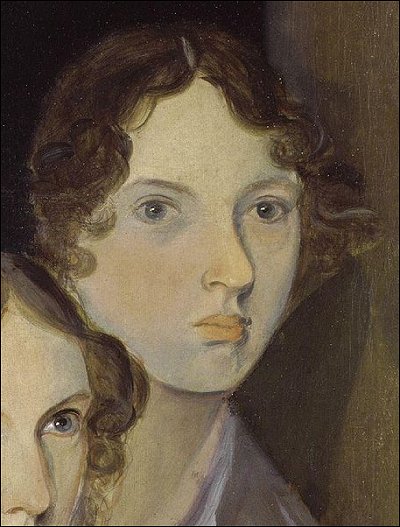
Emily Brontë poetry
fleursdumal.nl magaziine
More in: Anne, Emily & Charlotte Brontë, Brontë, Anne, Emily & Charlotte
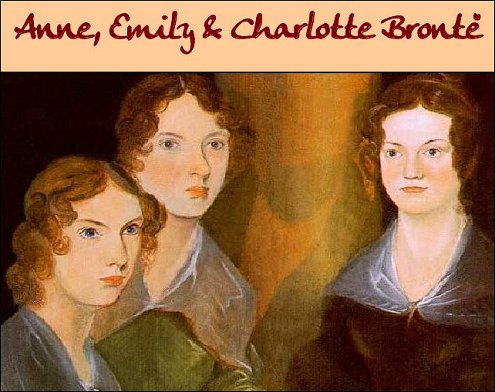
Anne Brontë
(1820-1849)
The Penitent
I mourn with thee, and yet rejoice
That thou shouldst sorrow so;
With angel choirs I join my voice
To bless the sinner’s woe.
Though friends and kindred turn away,
And laugh thy grief to scorn;
I hear the great Redeemer say,
“Blessed are ye that mourn.”
Hold on thy course, nor deem it strange
That earthly cords are riven:
Man may lament the wondrous change,
But “there is joy in heaven!”
A Reminiscence
Yes, thou art gone! and never more
Thy sunny smile shall gladden me;
But I may pass the old church door,
And pace the floor that covers thee,
May stand upon the cold, damp stone,
And think that, frozen, lies below
The lightest heart that I have known,
The kindest I shall ever know.
Yet, though I cannot see thee more,
‘Tis still a comfort to have seen;
And though thy transient life is o’er,
‘Tis sweet to think that thou hast been;
To think a soul so near divine,
Within a form so angel fair,
United to a heart like thine,
Has gladdened once our humble sphere.
Lines composed in a Wood
on a windy Day
My soul is awakened, my spirit is soaring
And carried aloft on the wings of the breeze;
For above and around me the wild wind is roaring,
Arousing to rapture the earth and the seas.
The long withered grass in the sunshine is glancing,
The bare trees are tossing their branches on high;
The dead leaves beneath them are merrily dancing,
The white clouds are scudding across the blue sky
I wish I could see how the ocean is lashing
The foam of its billows to whirlwinds of spray;
I wish I could see how its proud waves are dashing,
And hear the wild roar of their thunder to-day!
The Arbour
I’ll rest me in this sheltered bower,
And look upon the clear blue sky
That smiles upon me through the trees,
Which stand so thick clustering by;
And view their green and glossy leaves,
All glistening in the sunshine fair;
And list the rustling of their boughs,
So softly whispering through the air.
And while my ear drinks in the sound,
My winged soul shall fly away;
Reviewing lone departed years
As one mild, beaming, autumn day;
And soaring on to future scenes,
Like hills and woods, and valleys green,
All basking in the summer’s sun,
But distant still, and dimly seen.
Oh, list! ’tis summer’s very breath
That gently shakes the rustling trees–
But look! the snow is on the ground–
How can I think of scenes like these?
‘Tis but the FROST that clears the air,
And gives the sky that lovely blue;
They’re smiling in a WINTER’S sun,
Those evergreens of sombre hue.
And winter’s chill is on my heart–
How can I dream of future bliss?
How can my spirit soar away,
Confined by such a chain as this?

Acton Bell (Anna Brontë) poetry
fleursdumal.nl magazine
More in: Anne, Emily & Charlotte Brontë, Brontë, Anne, Emily & Charlotte
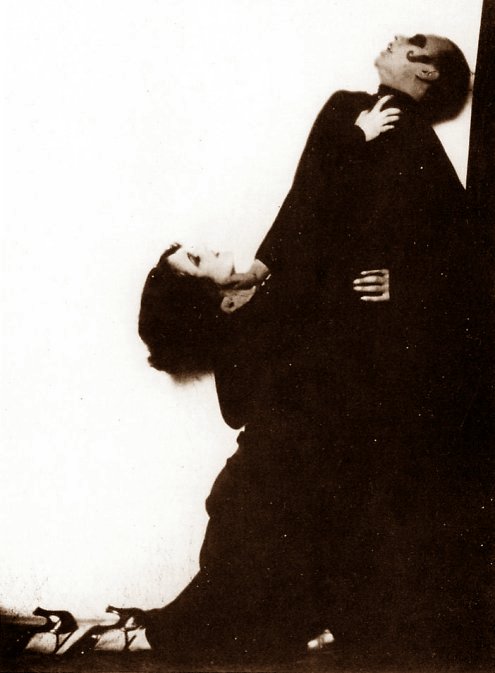
A n i t a B e r b e r
(1899-1928)
K o k a i n
Wände
Tisch
Schatten und Katzen
Grüne Augen
Viele Augen
Millionenfache Augen
Das Weib
Nervöses zerflatterndes Begehren
Aufflackerndes Leben
Schwälende Lampe
Tanzender Schatten
Kleiner Schatten
Großer Schatten
Der Schatten
Oh – der Sprung über den Schatten
Er quält dieser Schatten
Er martert dieser Schatten
Er frißt mich dieser Schatten
Was will dieser Schatten
Kokain
Aufschrei
Tiere
Blut
Alkohol
Schmerzen
Viele Schmerzen
Und die Augen
Die Tiere
Die Mäuse
Das Licht
Dieser Schatten
Dieser schrecklich große schwarze Schatten.
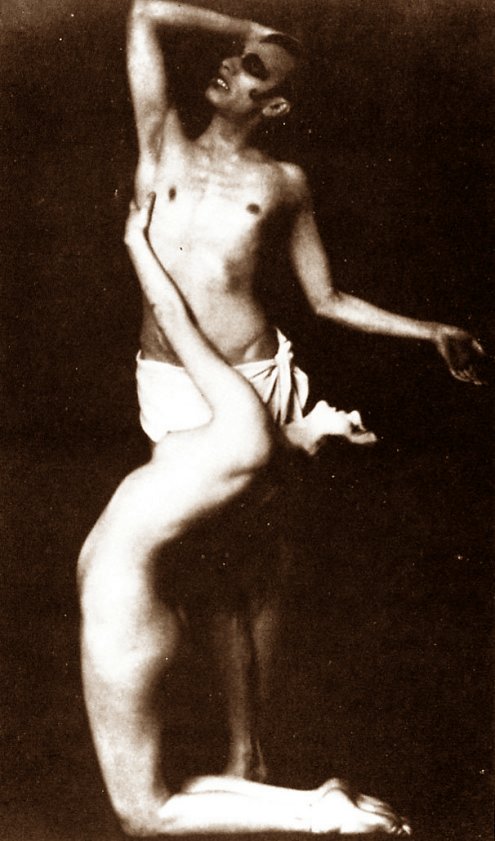
anita berber gedichte
fleursdumal.nl magazine
More in: Anita Berber, Anita Berber, Berber, Berber, Anita, DANCE & PERFORMANCE
.jpg)

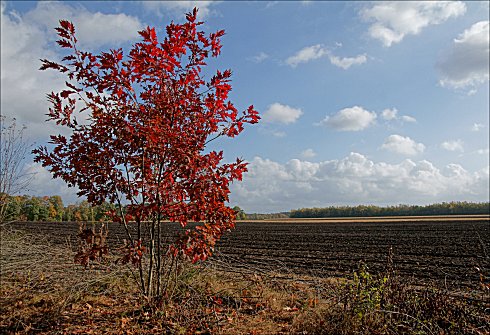
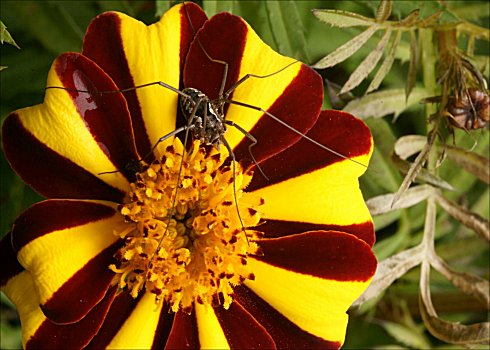
J o h n K e a t s
(1795-1821)
T o A u t u m n
Season of mists and mellow fruitfulness,
Close bosom-friend of the maturing sun;
Conspiring with him how to load and bless
With fruit the vines that round the thatch-eves run;
To bend with apples the moss’d cottage-trees,
And fill all fruit with ripeness to the core;
To swell the gourd, and plump the hazel shells
With a sweet kernel; to set budding more,
And still more, later flowers for the bees,
Until they think warm days will never cease,
For Summer has o’er-brimm’d their clammy cells.
Who hath not seen thee oft amid thy store?
Sometimes whoever seeks abroad may find
Thee sitting careless on a granary floor,
Thy hair soft-lifted by the winnowing wind;
Or on a half-reap’d furrow sound asleep,
Drows’d with the fume of poppies, while thy hook
Spares the next swath and all its twined flowers:
And sometimes like a gleaner thou dost keep
Steady thy laden head across a brook;
Or by a cyder-press, with patient look,
Thou watchest the last oozings hours by hours.
Where are the songs of Spring? Ay, where are they?
Think not of them, thou hast thy music too,–
While barred clouds bloom the soft-dying day,
And touch the stubble-plains with rosy hue;
Then in a wailful choir the small gnats mourn
Among the river sallows, borne aloft
Or sinking as the light wind lives or dies;
And full-grown lambs loud bleat from hilly bourn;
Hedge-crickets sing; and now with treble soft
The red-breast whistles from a garden-croft;
And gathering swallows twitter in the skies.

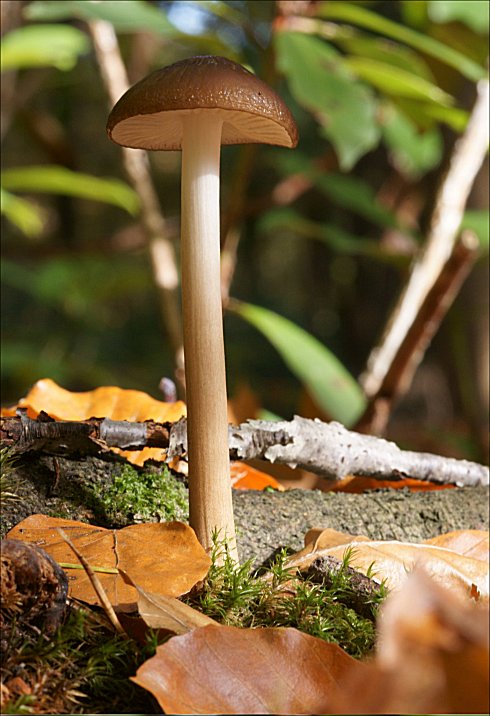
Natuurdagboek Hans Hermans October 2009
Photos Hans Hermans – Poem: John Keats
fleursdumal.nl magazine
More in: 4SEASONS#Autumn, Hans Hermans Photos, John Keats, Keats, John
Thank you for reading Fleurs du Mal - magazine for art & literature